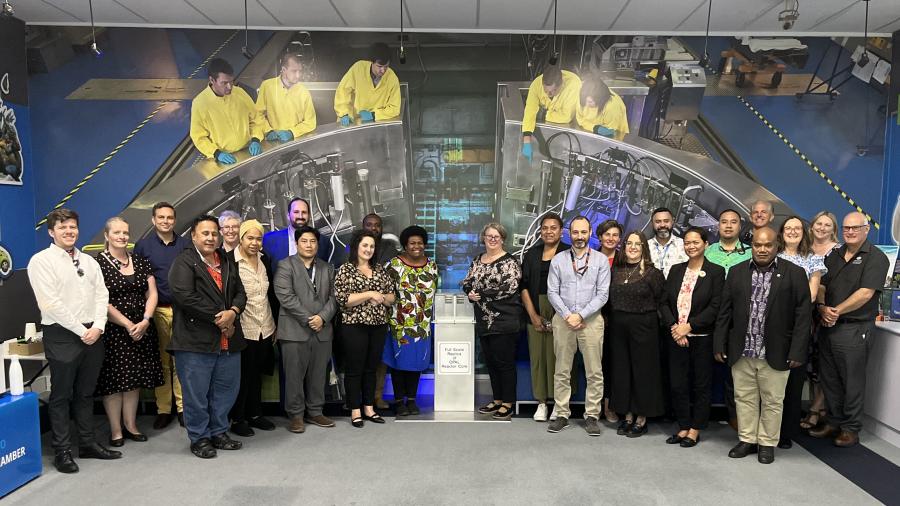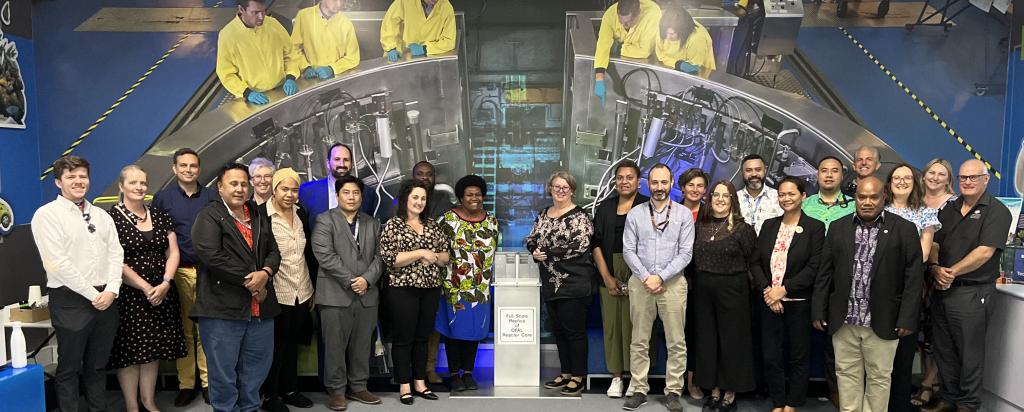

Published on the 26th February 2024 by ANSTO Staff
In early February, ANSTO was honoured to host the International Atomic Energy Agency (IAEA) National Liaison Officers Meeting and Sub Regional Approach to the Pacific Islands (SAPI) Programme, which focused on the development and delivery of the IAEA Technical Cooperation Programme in the Pacific.
This workshop offered officials from the Pacific island countries of Fiji, the Republic of the Marshall Islands, Papua New Guinea, Samoa, Tonga, and Vanuatu the opportunity to come together to discuss how technical cooperation is implemented within their countries.
While at ANSTO, the Pacific officials visited ANSTO’s OPAL multi-purpose reactor, the Australian Centre for Neutron Scattering, the Centre for Accelerator Science, and met some of ANSTO’s teams in our Environmental Monitoring laboratories.
We spoke about how nuclear science and technology can address areas such as human health, climate change, water resource management, and food provenance.
ANSTO invited colleagues from DFAT, ARPANSA and ASNO to meet with the visiting officials to highlight their areas of work.
The Ambassador for Arms Control and Counter-Proliferation, H.E. Vanessa Wood, recognised the importance of the IAEA’s work with the Pacific to support access to nuclear technology and its benefits for human health, food security, and the environment.
“The IAEA’s work supports us all, including through this important workshop hosted at ANSTO. Its integrity and independence are critical, including as the international authority on nuclear safety standards and key forum for scientific and technical cooperation in the nuclear field” Ms Wood said.
ANSTO Group Executive for Nuclear Operations and Nuclear Medicine, Pamela Naidoo-Ameglio, said she was delighted that ANSTO hosted the IAEA National Liaison Officers Meeting and Sub Regional Approach to the Pacific Islands (SAPI) Programme and hopes that it will help to foster deeper cooperation within the Pacific region.
“Nuclear science and technology provide a significant way to achieve social and economic growth within our region - from food security to climate change, to provenance and authenticity of our exports, to cancer care.
“The participants in this programme will help to shape the future, and I know that ANSTO looks forward to continue working alongside our Pacific family to help achieve this growth.” Ms Naidoo-Ameglio said.
Our Pacific officials thanked ANSTO for the warm welcome and kind hospitality, and appreciated learning of our cutting-edge research, especially First Nation collaborations.
Director of ANSTO’s Environment Research and Technology Group, Dr Karina Meredith, delivered closing remarks on behalf of ANSTO and thanked all the officials for their engagement over the week.
“Nuclear science and technology can tell us so much about our oceans, whether it be the impacts of climate change, the health of our seafood, or the movement of salt water into fresh water.”
She also shared her joy knowing that many of the nations will be sending representatives to ANSTO later this year for a hydrology workshop.